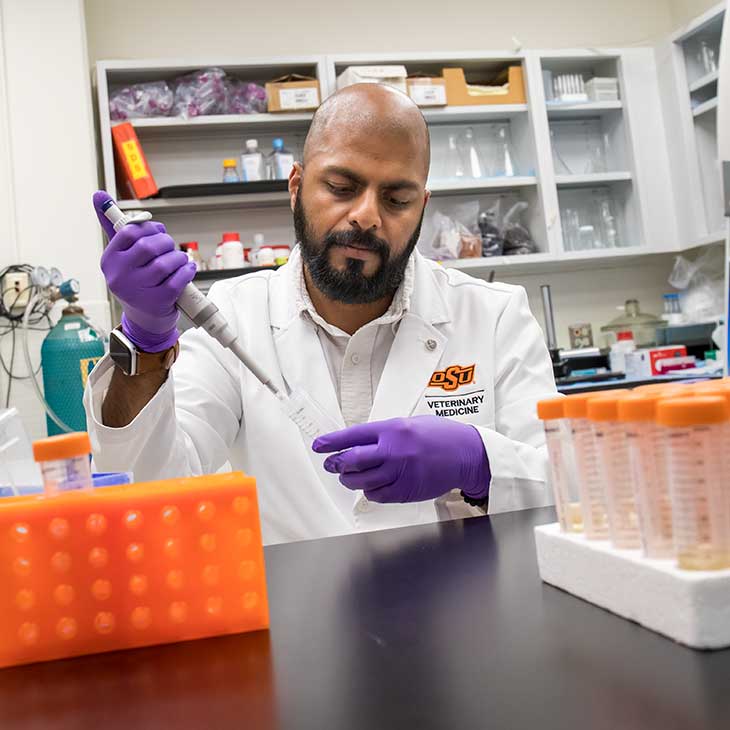
OSU CVM faculty secure prestigious NIH Grants for groundbreaking research
Tuesday, October 1, 2024
Media Contact: Kinsey Reed | Communications Specialist | 405-744-6740 | kinsey.reed@okstate.edu
Two Oklahoma State University College of Veterinary Medicine faculty members received a research project grant through the National Institutes of Health.
The National Institutes of Health is the largest public funder of biomedical research seeking to enhance life and reduce illness and disability. NIH-funded research has led to breakthroughs and new treatments and has built the research foundation that drives discovery.
Research project grants, or R01 grants, support a defined project conducted by a researcher within their area of expertise. The R01 grants help support a discrete, specified, circumscribed project to be performed by the named investigator in an area representing his or her specific interest and competencies.
Dr. Rudra Channappanavar, assistant professor in veterinary pathobiology received a grant for his research on the role of ERK1/2 signaling in SARS-CoV-2-induced dysregulated immunity and lung pathology. The study will investigate the basis for severe pneumonia caused by SARS-CoV-2 infections. Channappanavar's research is crucial to understanding the impact of viral diseases on the lungs.
“As far we know, this is a unique and novel approach in immunomodulatory therapeutics to mitigate virus induced lethal inflammation and reduce disease severity," Channappanavar said. “We hope our study will provide enough information to translate our results into a human clinical trial.
"A former summer research veterinary student Titus Patton and several graduate students, specifically Rakshya Shrestha and Roshan Ghimire have contributed to this project."
Dr. Madhan Subramanian, assistant professor of physiological sciences, has been awarded an R01 grant for his project on brainstem glial senescence and dysfunction. Subramanian's research will explore how specific brain cells regulate activities in the peripheral nervous system, contributing to an increased risk of cardiovascular disease in certain individuals. This study is critical for elucidating the connections between obesity, hypertension, and cardiovascular health.
“Our recent R01 funding from the National Institutes of Health will address a novel, central mechanism that could be pharmacologically targeted for reducing or preventing the heightened risk for cardiovascular diseases in obese individuals,” Subramanian said. “Specifically, we will address how altered glial function in the brainstem contributes to hypertension in obesity”
“R01 grants are highly competitive to receive, with success rates often falling below 10% of applicants,” said Jerry Malayer, senior associate dean for research and graduate education.
R01 grants are awarded for a duration of three to five years and may be renewed through a competitive process. As the oldest and most prestigious grant offered by the NIH, the R01 is considered the gold standard for biomedical research.
